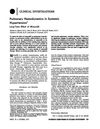 57 citations,
January 1980 in “Journal of Cardiovascular Pharmacology”
57 citations,
January 1980 in “Journal of Cardiovascular Pharmacology” Minoxidil treats high blood pressure and side effects can be managed.
 51 citations,
October 1980 in “The New England Journal of Medicine”
51 citations,
October 1980 in “The New England Journal of Medicine” Minoxidil lowers blood pressure effectively but may cause unwanted hair growth and other side effects.
 50 citations,
September 1975 in “American Heart Journal”
50 citations,
September 1975 in “American Heart Journal” Minoxidil effectively controls blood pressure in severe cases, but may cause fluid retention and edema.
 46 citations,
December 2007 in “International Journal of Cardiology”
46 citations,
December 2007 in “International Journal of Cardiology” People with polycystic ovary syndrome may have a higher risk of heart problems due to abnormal nervous system control of their heart and blood pressure.
 45 citations,
January 1981 in “Annals of Internal Medicine”
45 citations,
January 1981 in “Annals of Internal Medicine” Minoxidil controls blood pressure effectively, but may cause side effects like hypertrichosis.
 43 citations,
May 1978 in “JAMA”
43 citations,
May 1978 in “JAMA” Minoxidil controls blood pressure but may cause kidney damage and needs diuretics to prevent swelling.
 42 citations,
January 2019 in “Frontiers in Immunology”
42 citations,
January 2019 in “Frontiers in Immunology” A blood pressure drug, diltiazem, may also help treat influenza.
 37 citations,
April 1979 in “The Journal of Clinical Pharmacology”
37 citations,
April 1979 in “The Journal of Clinical Pharmacology” Minoxidil effectively controls blood pressure but side effects may limit its use.
 36 citations,
July 1977 in “The Journal of Pediatrics”
36 citations,
July 1977 in “The Journal of Pediatrics” Minoxidil helps lower blood pressure in kids with severe hypertension, but may cause temporary excessive hair growth.
 30 citations,
November 2009 in “British Journal of Dermatology”
30 citations,
November 2009 in “British Journal of Dermatology” Higher aldosterone levels link to hair loss and high blood pressure.
 26 citations,
June 1983 in “Journal of Hypertension”
26 citations,
June 1983 in “Journal of Hypertension” Minoxidil lowers blood pressure more effectively but has more side effects, so try hydralazine first.
 26 citations,
January 1978 in “Nephron”
26 citations,
January 1978 in “Nephron” Minoxidil lowers blood pressure effectively but may cause side effects.
 22 citations,
January 1979 in “JAMA”
22 citations,
January 1979 in “JAMA” Minoxidil can lower blood pressure effectively and safely in emergencies.
 20 citations,
February 1977 in “Circulation”
20 citations,
February 1977 in “Circulation” Minoxidil lowers blood pressure and increases heart efficiency, but may raise lung artery pressure in some people.
 19 citations,
March 1990 in “Journal of Cardiovascular Pharmacology”
19 citations,
March 1990 in “Journal of Cardiovascular Pharmacology” Minoxidil affects rat fluid dynamics, altering pressure and circulation, improving blood flow and hair growth.
 19 citations,
July 1983 in “American Journal of Kidney Diseases”
19 citations,
July 1983 in “American Journal of Kidney Diseases” Minoxidil lowers blood pressure in kids with kidney issues, but use carefully due to side effects.
18 citations,
January 1976 in “Drugs” New treatments improved blood pressure control in patients with resistant hypertension.
 17 citations,
April 1972 in “PubMed”
17 citations,
April 1972 in “PubMed” Minoxidil lowers blood pressure and spreads throughout the body in normal rats.
 16 citations,
March 1981 in “PubMed”
16 citations,
March 1981 in “PubMed” Minoxidil significantly lowers blood pressure in patients with hard-to-treat hypertension, but can cause fluid retention and excessive hair growth.
15 citations,
August 2017 in “Pediatrics in review” Regular blood pressure checks and lifestyle changes are crucial for managing hypertension in children and teens.
 15 citations,
November 2015 in “Dermatology Research and Practice”
15 citations,
November 2015 in “Dermatology Research and Practice” No clear link between hair loss and metabolic syndrome, but some differences in blood pressure and glucose levels.
 14 citations,
March 2016 in “Journal of Dermatology”
14 citations,
March 2016 in “Journal of Dermatology” Hair loss links to high blood pressure, high fat levels, and metabolic issues, suggesting early heart disease screening.
 14 citations,
April 2009 in “Acta Medica Scandinavica”
14 citations,
April 2009 in “Acta Medica Scandinavica” Minoxidil helps control blood pressure but has side-effects, so it's not for everyone.
 13 citations,
April 2009 in “Acta Medica Scandinavica”
13 citations,
April 2009 in “Acta Medica Scandinavica” Minoxidil lowers blood pressure and causes hair growth, with some side effects.
 11 citations,
March 2007 in “Journal of Hypertension”
11 citations,
March 2007 in “Journal of Hypertension” Minoxidil effectively lowers blood pressure in resistant cases, but needs beta-blocker and diuretic support.
 6 citations,
October 1979 in “Chest”
6 citations,
October 1979 in “Chest” Minoxidil lowers blood pressure without worsening lung pressure but can cause increased hair growth.
 5 citations,
December 2016 in “Journal of skin and stem cell”
5 citations,
December 2016 in “Journal of skin and stem cell” People with cutaneous Lichen Planus are more likely to have Metabolic Syndrome and related conditions like high cholesterol, diabetes, and high blood pressure.
 2 citations,
February 2021 in “Brain Research”
2 citations,
February 2021 in “Brain Research” Testosterone affects blood pressure control and inflammation in male rats with endotoxic shock, and blocking certain hormones may help treat it.
 2 citations,
September 2020
2 citations,
September 2020 Long-term high testosterone levels can improve bone density and reduce body fat but may increase the risk of prostate cancer and high blood pressure.
 April 2023 in “Nigerian Journal of Clinical Practice”
April 2023 in “Nigerian Journal of Clinical Practice” Hair loss in adults is linked to heart disease risk factors like unhealthy blood fats, lack of exercise, and alcohol use. It's also slightly more common in people with metabolic syndrome. As people age, hair loss gets worse. In men, severe hair loss is tied to high blood pressure and a larger waist. In women, it's tied to higher body weight. People with hair loss should be checked for unhealthy blood fats and advised to avoid alcohol and inactivity.




























